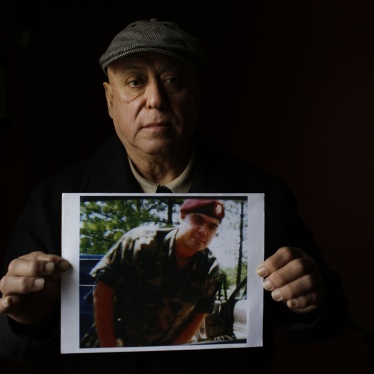The U.S. government’s return of hundreds of fleeing Haitians to the capital Port-au-Prince violates their right not to be sent back to a place where their lives or freedom are endangered, Human Rights Watch said today.
The U.S. Coast Guard already has repatriated at least 867 Haitians, according to news reports. International law prohibits sending fleeing Haitians back to Haiti in the current conditions of instability, which persist despite the arrival of U.S. Marines as part of a planned Multinational Interim Force.
On Friday and Saturday, the U.S. Coast Guard dropped off the asylum seekers at the Haitian capital’s main port, where violence and widespread looting were taking place. Journalists on the scene described how those returned had to make their way through a hostile crowd of pro-government supporters.
“Given the violence and disorder reigning in Port-au-Prince, the 867 Haitians should never have been returned there,” said Joanne Mariner, deputy director of Human Rights Watch’s Americas Division. “With people being shot dead in the street by gangs of criminal thugs, it was unconscionable for the United States to dump entire families into this danger zone.”
Armed supporters of Haitian President Jean-Bertrand Aristide were in control of Port-au-Prince on Friday and Saturday, and engaged in widespread looting, summary executions, robbery, carjackings and other acts of violence. Early Sunday morning, Aristide left the country. Despite the arrival of U.S. Marines, insecurity prevails throughout the country.
Conditions in Haiti are too dangerous to permit the safe return of Haitians to their country. By failing to allow fleeing Haitians to remain at least temporarily in a place of safety, the U.S. government has so far violated human rights standards. On February 25 the United Nations High Commissioner for Refugees (UNHCR) recommended that neighboring countries suspend forced returns to Haiti. The UNHCR specifically stated that “rejected asylum seekers, those with asylum claims pending, new arrivals and those interdicted” at sea should be granted temporary protection from return.
The UNHCR’s Executive Committee, of which the United States is a member, has emphasized that governments have an absolute obligation not to send people back to places where they risk being persecuted, tortured or killed. It has stated that persons fleeing “events seriously disturbing public order in either part of, or the whole of their country of origin or nationality [who] are compelled to seek refuge outside that country” are asylum seekers who must be “fully protected.” The Executive Committee has also pointed out that "asylum seekers rescued at sea should always be admitted at least on a temporary basis."
Over the past few days, the United States has flouted these rules and placed lives at risk. Meanwhile, the government of the Dominican Republic has also violated these standards by closing its borders to fleeing Haitians.
Given the continuing instability in Haiti, the United States and other governments in the region must allow fleeing Haitians to be admitted to their territory, receive assistance and be temporarily protected from return. This temporary protection should be continued at least until conditions allow Haitians to return safely and their individual claims for refugee status have been fully heard.
In addition to the violence, UNHCR and the humanitarian organization Oxfam have warned of a humanitarian crisis in Haiti because fuel shortages and insecurity have been impeding the delivery of food and other humanitarian supplies.
“The United States must immediately stop returning Haitians who flee their country,” Mariner said. “The situation is so dangerous and unpredictable that no one is necessarily safe: neither Aristide supporters, nor opposition members, nor Haitians who are merely caught in the midst of rampant violence and a humanitarian crisis.”






